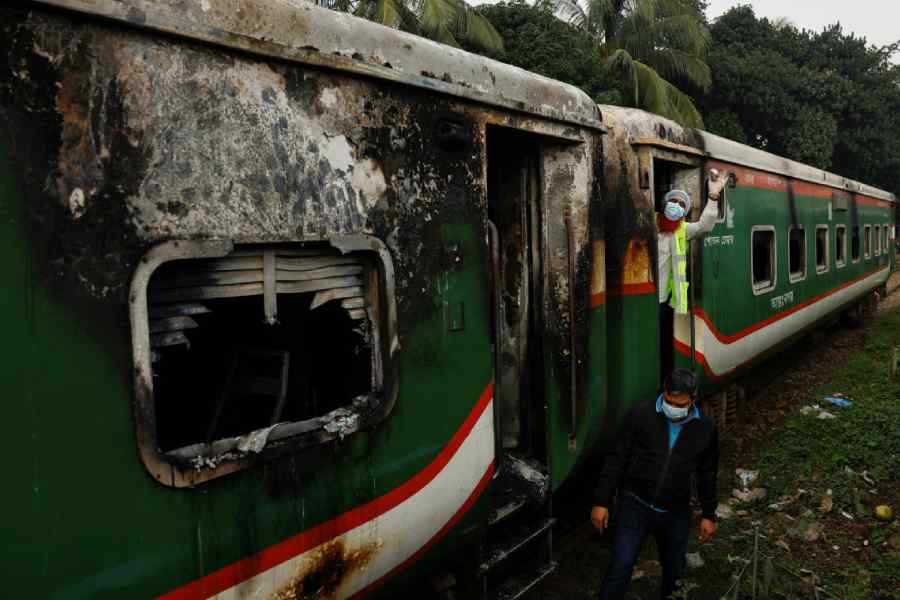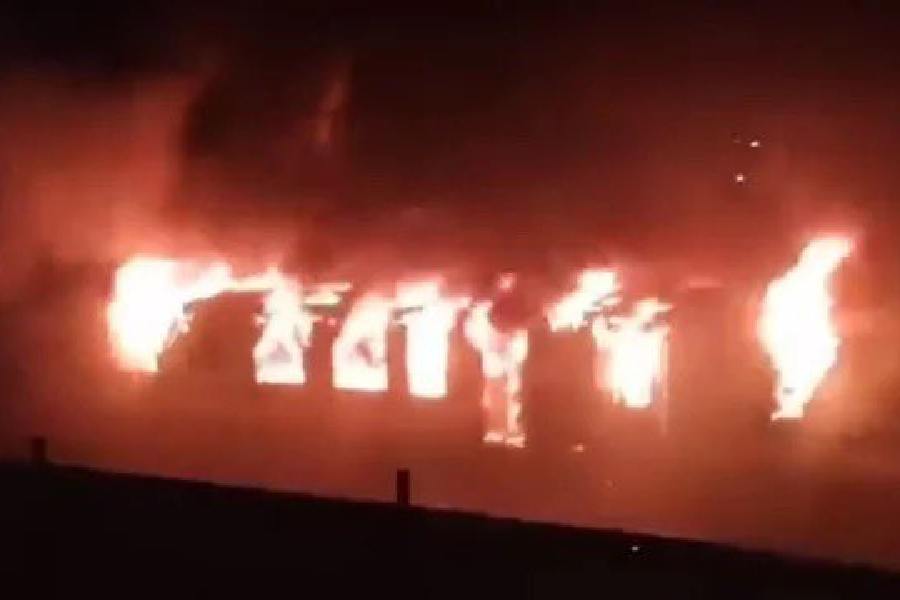A passenger train was set ablaze in Bangladesh on Tuesday, killing four people, including a mother and child, the tragedy indicating that a prolonged phase of uncertainty looms over the neighbouring country which goes to polls on January 7.
The arson attack on the train took place amid a nationwide strike — which had little impact on normal life — called by the Opposition parties to press for their demand for a caretaker government in place of the Sheikh Hasina-led Awami League establishment to ensure a free and fair election.
As the main Opposition party, the BNP, has opted out of the electoral battle due to the non-fulfilment of its demand, the election for 300 seats is likely to be a one-sided affair. Entities such as Jatiya Party and some newly floated outfits such as Trinamool BNP Bangladesh are in the fray, and there is hardly any contest other than in 50-odd constituencies where official ruling party nominees are facing the challenge from party colleagues contesting as Independents.
If the buzz in Dhaka is to be believed, the battle is somewhere else, which Tuesday morning’s attack on the train revealed. “Lack of contest in the polls does not necessarily mean a smooth run-up to the poll date or thereafter as the Opposition parties will try their best to derail the election or get it countermanded after January 7,” said a source in Dhaka.
Dhaka Metropolitan police commissioner Habibur Rahman confirmed this hypothesis while talking to reporters as he described the fire incident as an act of sabotage before holding those behind the strike responsible for it.
According to media reports, three coaches of the Dhaka-bound Mohanganj Express were set on fire in the capital’s Tejgaon area around 5.04am. Among the victims were a woman and her three-year-old son who were charred to death.
Railway minister Nurul Islam Sujan said during a news conference in the afternoon that trains were facing constant attacks during the BNP’s blockades and strikes since October 28 when an Opposition rally turned violent and six persons were killed.
The BNP-led Opposition called five strikes and imposed nationwide blockades for 22 days. Though the shutdown calls had little impact on normal life, at least 30 arson attacks on trains and hundreds of incidents of setting buses or vehicles on fire were reported from across the country.
Right now, the BNP’s top leadership is missing in action as party chairperson Khaleda Zia has been ill and is currently undergoing treatment. Her son and acting chairman Tarique Rahman has been in the UK for 15 years while its senior leadership is behind bars, accused in a variety of cases.
The absence of the senior leadership of the BNP — which has drawn the attention of the world and raised questions about the democratic structure in the country — has, however, not robbed the party of its firepower as its foot soldiers and ally Jamaat-e-Islami, along with its various wings, have considerable clout across the country.
Amid questions on social media on why innocent lives would be lost during strikes called by the Opposition to press for a political demand, the BNP leadership was quick to demand a judicial inquiry into the train fire incident.
“This kind of heinous and diabolical work is possible only with the help of illegal and anti-people forces,” senior joint secretary-general of the BNP, Ruhul Kabir Rizvi, who is in hiding fearing arrest, was quoted by Reuters as saying.
While the BNP tried to dissociate from the attack on the train, the party has a tradition of organising violent protests. In the run-up to the 2014 elections, which the BNP-Jamaat combine boycotted, at least 150 people were killed in street violence as setting vehicles on fire by using cocktail bombs had become a norm in the three-month period preceding elections.
Cocktail bomb is a generic name used for a variety of bottle-based improvised incendiary weapons, which leave the victims with burns and splinter injuries.
“We all want an inclusive election in which all political parties take part.... The problem with the Opposition is that they won’t take part in the contest,” said Miti Sanjana, a barrister and a rights activist.
Several reports from the ground have indicated that anti-incumbency has kicked in across the country and Hasina, after 15 years in power, would have faced challenges had the Opposition put its act together and contested the polls.
“They (the Opposition) do not hit the streets with five lakh people to challenge the government. They organise only strikes and blockades.... A majority of people in our country do not approve of this brand of politics as innocent lives are lost and the working class loses income opportunities,” she added.
Despite the disapproval of violence that Sanjana spoke about, the fear of violence ahead of the polls is palpable across Bangladesh amid intelligence reports that different splinter groups are likely to create unrest over the next two weeks or so with an aim to derail the elections and embarrass the Hasina regime.
Multiple sources in the security establishment in Bangladesh said that the government is taking special measures — by deploying armed forces to protect the railways, which has become a new target — to reduce the possibility of arson attacks.
According to a security expert, the possibilities of more arson attacks loom large as the Opposition parties will be desperate to create unrest in a last-ditch attempt to derail the election.
“The Opposition parties were depending on the West, especially the US, to pressurise Hasina to resign and put in place a caretaker government... As that hope did not come true, they would try to create unrest so that the polls, even if they are held, are countermanded,” said the source.












